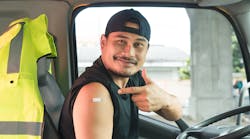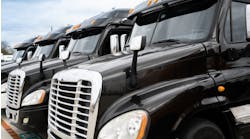Encouragements, incentives, mandates: Fleets grapple with COVID vaccinations
This summer, fewer than half of the drivers and other employees at Tyson Foods were vaccinated against COVID-19. Among the unvaccinated was Phillip Vanhook, Tyson’s managing director of transportation operations, who oversees the company’s private fleet of more than 1,350 drivers.
Vanhook “wasn’t an anti-vaxxer. I wasn’t for it. I wasn’t against it. I was just a stubborn male, I guess,” he told FleetOwner during the McLeod Software User Conference 2021 in Grapevine, Texas. Now, the fleet leader is working hard to convince his drivers to get the COVID vaccine.
On July 28, Vanhook got what he called his “calling card on this” when he tested positive for the virus responsible for more than 650,000 American deaths over the past 18 months. “It absolutely kicked my butt” and nearly sent him to the hospital, he recalled less than two months later. “I was able to tell my drivers what happened to me.”
Vanhook, who last week was still battling with lingering effects of COVID, said he was struggling to smell anything and had a sore throat. But he is now vaccinated, which is becoming a requirement to work for Tyson.
In August, Tyson Foods mandated that all of its U.S. employees get vaccinated by November. “We heard it the same day that our drivers heard it, that our technicians heard it, that our office staff heard it,” Vanhook said. “Nobody likes to be told what to do. So you can imagine the response.”
When Tyson announced the mandate in August, it said it was the largest U.S. food company to require COVID-19 vaccinations for its entire workforce. At the time, about 45% of its total workforce was vaccinated. By Sept. 12, at least 72% of Tyson employees were vaccinated. The White House used these statistics when President Biden announced that the Occupational Safety and Health Administration (OSHA) is developing a rule to require businesses with at least 100 employees to mandate vaccinations within their workforces—or conduct weekly COVID-19 tests among the unvaccinated.
Encouragement over requirement
Chris Spear, president and CEO of the American Trucking Associations, called Biden’s vaccine mandates “well-intentioned” but added: “they could cause further disruptions throughout the supply chain, impeding our nation’s COVID response efforts and putting the brakes on any economic revival.”
Speaking during the ATA’s Technology & Maintenance Council (TMC) fall meeting in Cleveland on Sept. 13, Spear said that the “ATA is examining all options and will choose a path that protects our industry.”
ReedTMS Logistics, an asset-based third-party logistics provider (3PL) and brokerage service, has seen its operations impacted by COVID this summer. “I would say over the last three months, we’ve probably had 10 non-driving personnel out at any given time and 10 driving personnel out at any given time,” Mark Reed, the company president and CFO, told FleetOwner during an on-stage interview at the 2021 McLeod User Conference on Sept. 14. “So it’s been a big impact.”
Reed said that while he and his fellow company leaders discussed making the vaccine mandatory, they decided to focus more on encouraging employees to get the jab. “I feel like we need to let our employees make their own decisions,” Reed said. “So we haven’t gone down the path to mandate it.”
While it’s not mandated, Reed offers office and driver employees paid time off to get vaccinated. “If they need to take a half-day to do that, we’ll give them the time to get it done and not count it as absent time,” he said.
Based in Tampa, Florida, Reed has 350 full-time employees working in five states. The company offers full truckload, less than truckload, freight management, and dedicated services. Based on a recent company-wide survey, about 60% of Reed employees—drivers and non-drivers—are vaccinated.
“I felt like that was a pretty good number,” Reed said. “I didn’t feel like there was any need to keep pushing it further than that. But we’re asking those who are not vaccinated to wear masks when they aren’t at their desks—just to be precautionary.”
Reed said that he’s found his staff complying. “I don’t think the people who aren’t vaccinated love the fact that they have to wear masks,” he explained. “I think they also understand that they could get vaccinated if they want to. Maybe we’re pushing a few buttons without completely going over the top and mandating vaccination.”
Education over exodus
At Tyson, many workers were angry about the company’s mandate, Vanhook said. But there was no mass exodus of angry, unvaccinated drivers. “For anyone going through this, all I can suggest is educate, educate, educate,” Vanhook said. “We brought in a COVID doctor, who did a YouTube video to disperse to our team members. We did several meetings on Zoom to educate our team members.”
Some of the truck driving team members told Vanhook and his team that they would rather leave their job than get the COVID vaccine. “I’ve told many of them: ‘We all have bosses in our life. We’re going to be told at some point in our life what we are and aren’t allowed to do. We’re all grown men and women, and we will have to make some sort of decision.’”
Tom McLeod, the founder and CEO of McLeod Software, a transportation technology company, said he sees trucking companies being hesitant to mandate vaccines for fear of losing drivers who don’t want the shot.
McLeod, who is encouraging his employees to get vaccinated but not requiring it, said he remembers getting the polio vaccine as a child. “Everybody did it and nobody questioned it, to my knowledge.”
But the COVID vaccines have been questioned and mandates challenged. “It’s been so politicized that people are going to fight it regardless,” McLeod told FleetOwner. “It’s a mess and I’m not trying to stir up controversy.”
While McLeod thinks that mandates from companies such as Tyson Foods are more focused on the food production side of its business rather than its fleet drivers, a successful vaccination mandate could help encourage other companies to follow suit.
Vaccination rates on the rise
Since announcing the vaccination requirements and sharing his story of COVID battles, Vanhook said the driver response to mandates has grown positive. Tyson has conducted vaccination events at three of its terminals across the country. And the private fleet is giving away $10,000 to five vaccinated drivers and technicians each week as an incentive. “We’re also incentivizing office staff—just to push them forward,” Vanhook said. “Because we’re running out of time if they want to get the double-shot,” he said of the Pfizer and Moderna vaccines, which require two doses, spread out by a few weeks.
Another thing Vanhook found after the mandate and incentives were announced was that many of his staff were already vaccinated but had kept it quiet. “Once we announced the incentive, well, we got about 50% of our team members’ vaccine cards documented,” Vanhook said on Sept. 13. “We’re about 60% (of drivers) right now and we have about seven weeks to go before our Nov. 1 cutoff.”
Vanhook hopes that if he loses unvaccinated drivers, Tyson will be able to find other drivers—whether they be independent or new company drivers—looking for the steady work and traditionally higher pay that comes with driving for a private fleet.
Since he’s recovered from the worst of COVID, Vanhook was vaccinated and is trying to turn his own struggles—he nearly ended up in the hospital as his blood-oxygen levels dipped below 90%—into a positive for his company. Vanhook made a video about his battles with COVID, which was shared with his more than 1,350 private fleet truck drivers.
About one in 10 Tyson fleet drivers are women. The other 90% are taking the most convincing to get the vaccine, Vanhook said. “We’re very much headstrong, egotistical, and sometimes not the smartest animals on earth. We have to be educated in our thoughts and beliefs. I changed my mind while laying on the couch.”




